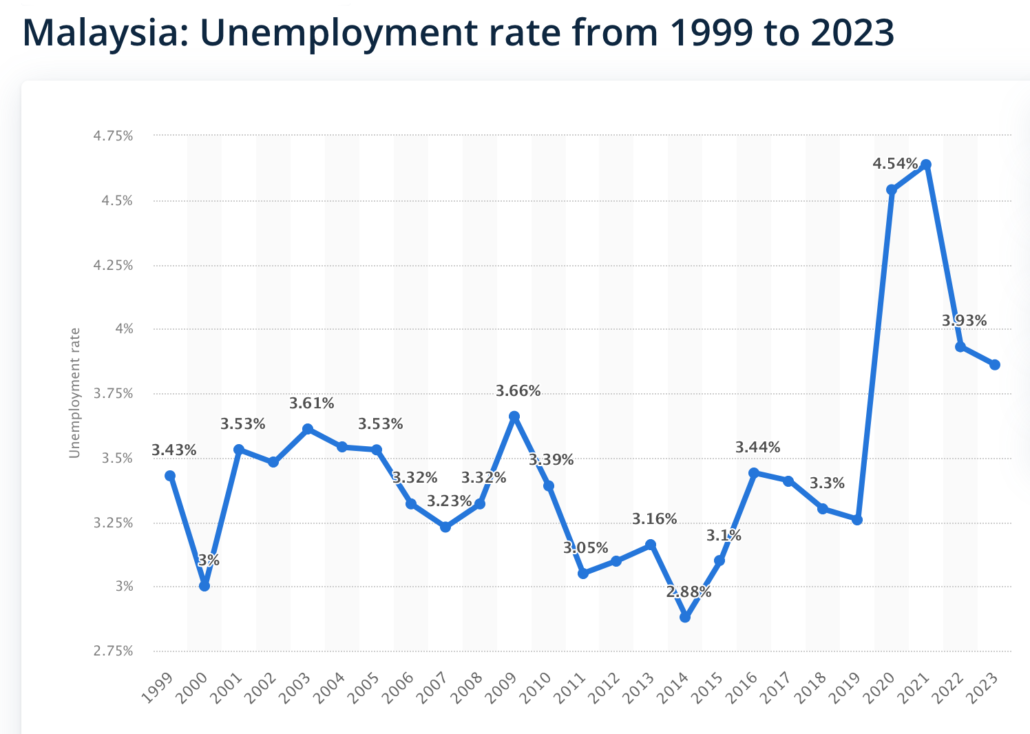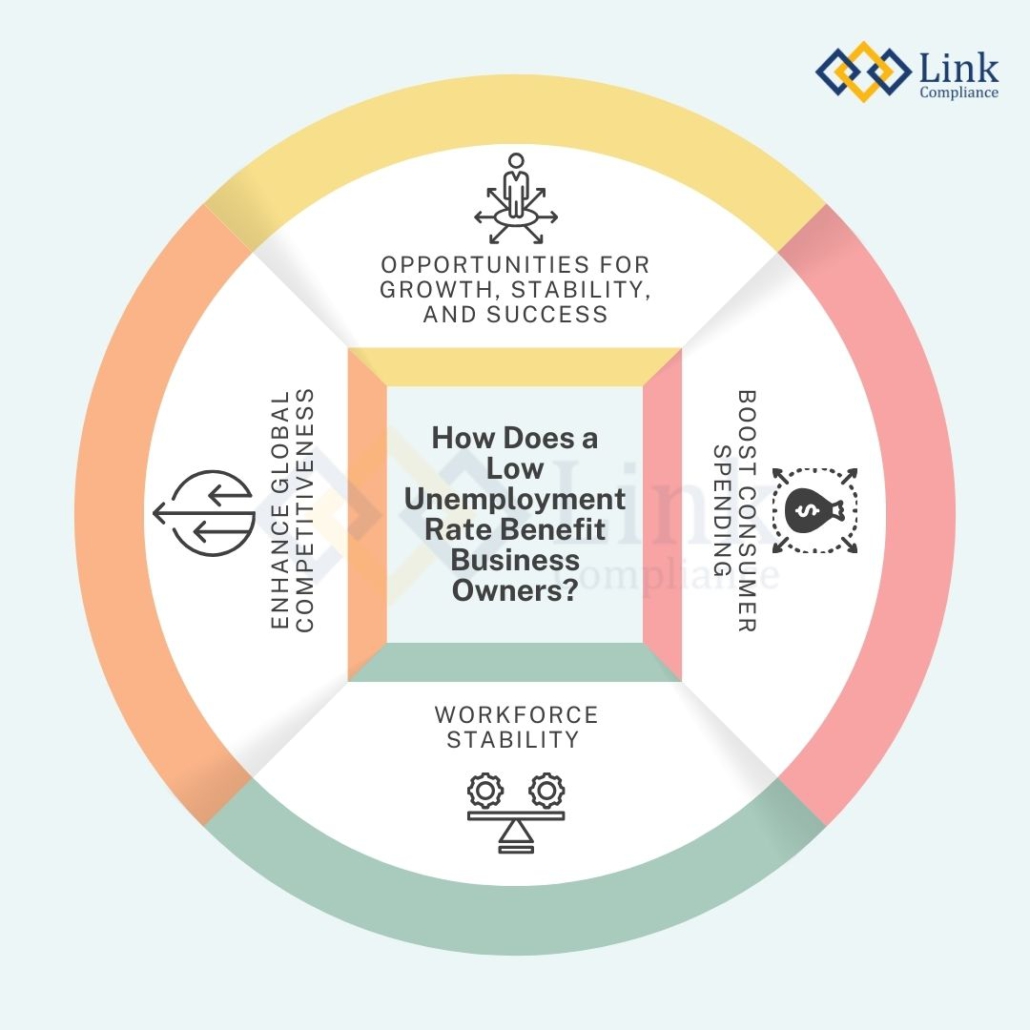In a rapidly changing global economy, Malaysia’s consistently low unemployment rate stands as a beacon of resilience and opportunity. But beyond the numbers, what does this mean for the everyday Malaysian?
Whether you are an entrepreneur looking to expand or a professional navigating your career, understanding these impacts could unlock new avenues for growth and stability in your life. Dive in to discover why this trend matters more than ever.
Economic Resilience: A Historical Perspective
Image source: Statista.com
Over the past two decades, Malaysia has consistently demonstrated economic resilience, with its unemployment rate hovering between 2.88% and 3.66% from 1999 to 2019. This stability fostered a strong job market, allowing for steady economic growth. However, the COVID-19 pandemic disrupted this trend, causing the unemployment rate to spike to 4.54% in 2020. Despite this setback, the country’s rapid recovery is evident, as the rate has steadily declined to 3.93% in 2023, highlighting the strength and adaptability of the Malaysian workforce.
Let’s uncover how a low unemployment rate ripples through the economy, benefiting everyone from business owners to job seekers.
Malaysia’s vibrant economy is considered one of the strongest in South East Asia. Together with years of political stability, it has been supporting such a low unemployment rate and good growth rates each year. Industry has been a strong contributor to GDP and currently provides around 30 percent of employment opportunities. But even more – about 50 percent – of GDP is generated by the services sector. Given the country’s strong and growing economy, average GDP per capita is growing at increasing rates as well.
Source: Statista.com
Economic Stability and Growth
A low unemployment rate signals a stable and growing economy, which in turn boosts business confidence. This economic stability encourages both domestic and foreign investments, leading to increased job creation and overall economic expansion.
Malaysia’s economic journey since gaining independence in 1957 has been remarkable, transitioning from an agricultural-based economy to one driven by manufacturing and services. This transformation positioned the country as a key exporter of electrical appliances and parts, lifting it from low to upper-middle-income status. Between 1960 and 2017, Gross National Income (GNI) per capita grew at an average annual rate of 6.9%, while poverty rates dropped significantly, with less than 1% of the population living below the extreme poverty line. Malaysia’s extensive global trade connections and improved healthcare, which raised life expectancy to 75 years by 2019, have also contributed to this success.
Despite economic challenges, such as the 1997-1998 Asian financial crisis, Malaysia has maintained stable growth, averaging 5.4% since 2010. Strategic policies emphasizing labour intensive growth, human capital investment, and sound governance have driven this development.
Source: https://www.worldbank.org/en/country/malaysia/overview
This economic transformation has also played a crucial role in maintaining Malaysia’s low unemployment rate. The shift toward manufacturing and services, combined with strong global trade connections, has created a wealth of job opportunities across multiple sectors. Strategic investments in human capital, driven by government policies focusing on labour intensive growth, have further developed a skilled workforce ready to meet the demands of a modern economy. Despite challenges like the Asian financial crisis, Malaysia’s stable growth trend has ensured consistent job creation, allowing the nation to maintain low unemployment rates while supporting the continued success of businesses and industries.
Updates –
Media release by the Ministry of Finance on the 16 August 2024 mentioned:
The labour market continued its positive momentum. Total employment grew by 2.8% to 16.6 million people. Around 190,000 new jobs were created, helping unemployment rate to stay low at 3.3%. The growth of salaries and wages in the services and manufacturing sectors also remained encouraging at 3.5% and 1.4%, respectively.
Business Owners: Reaping the Benefits of Economic Favourability
The low unemployment rate directly benefits business owners by ensuring a steady supply of skilled workers, reducing recruitment challenges. With total employment growing by 2.8% and 190,000 new jobs created, business owners have access to a larger pool of talent. This enables them to fill roles more efficiently and maintain smooth operations without long periods of vacancies, which can hinder productivity. Furthermore, the moderate growth in salaries and wages (3.5% in services and 1.4% in manufacturing) allows businesses to manage labour costs effectively while still attracting quality employees, providing a balanced approach to staffing.
The favourable economic conditions in Malaysia create a supportive environment for business owners, offering them opportunities for growth, stability, and success. A low unemployment rate plays a crucial role in this environment. With a higher percentage of the population employed, consumer purchasing power rises, leading to increased demand for goods and services. This elevated demand provides businesses with ample opportunities for growth and expansion, as they can cater to a larger and more affluent customer base.
In addition to boosting consumer spending, Malaysia’s stable economy and low unemployment attract both domestic and foreign investors. This influx of capital not only provides businesses with better access to funding but also opens doors to valuable partnerships, facilitating further development and innovation.
The benefits extend to workforce stability as well. With a wider range of employment opportunities, businesses can attract skilled talent more easily. This results in reduced turnover rates and improved operational efficiency, as companies enjoy a more committed and capable workforce.
A strong economy with low unemployment enhances global competitiveness. Businesses in Malaysia are well-positioned to leverage improved economic conditions, enabling them to export their products, collaborate with international partners, and explore new markets. This global reach supports sustained growth and helps businesses thrive in an increasingly interconnected world.
Job Seekers: Thriving in a Vibrant Labour Market
The creation of 190,000 new jobs and the low unemployment rate of 3.3% not only offer significant advantages to business owners but also provide substantial benefits to job seekers. For job seekers, Malaysia’s favourable economic conditions and low unemployment rate offer significant advantages.
A robust economy creates a wealth of employment opportunities across various sectors, making it easier for individuals to find jobs that match their skills and interests. As businesses expand and new industries emerge, job seekers benefit from a broader range of career options and the potential for higher wages, reflecting the increasing demand for skilled talent. This vibrant job market also means more opportunities for career advancement and professional development, as employers seek to attract and retain top talent by offering competitive benefits and growth prospects.
The stability of the job market provides job seekers with a sense of security. With low unemployment rates, there is less fear of sudden job losses and more confidence in long-term career prospects. This stability encourages individuals to invest in their professional growth, pursue further education, and engage in skill development, knowing that their efforts are likely to yield positive returns. Moreover, the strong economic environment supports job seekers by enhancing their bargaining power, allowing them to negotiate better salaries and working conditions.
–
Knowledge base:
Malaysia’s Labour force report, covering statistics on unemployment, employment, and labour force participation can be downloaded at: https://open.dosm.gov.my/publications/labour_month_2023-12
How Link Compliance Bridges the Gap Between Companies and Job Seekers?
In a dynamic economic environment like Malaysia, where businesses and job seekers are both navigating a rapidly evolving landscape, human resources companies play a pivotal role in bridging gaps and creating value. Link Compliance stands out as a key player, offering comprehensive solutions that benefit both organisations and individuals. By understanding the unique needs of companies and job seekers, Link Compliance provides targeted support that enhances talent acquisition, ensures regulatory compliance, and fosters career development. Here’s how their expertise can make a significant difference for both sides of the employment equation.
For Companies: Link Compliance enhances company operations by streamlining recruitment processes, offering expert guidance on compliance with employment laws, and supporting employee development. With our advanced recruitment technology and extensive networks, we ensure businesses find suitable talent efficiently. We also provide crucial compliance advice, helping companies navigate legal complexities and focus on core activities.
For Job Seekers: Link Compliance supports job seekers by providing access to a broad range of career opportunities and matching them with roles that align with their skills and goals. We offer valuable guidance throughout the job search, including resume building and interview preparation, to help candidates present themselves effectively.
–
More information, www.linkcompliance.com
Email: info@linkcompliance.com
–
Singapore | Malaysia | China | Indonesia | Taiwan | USA | Vietnam | Japan | Hong Kong | Germany | Turkey | Philippines





